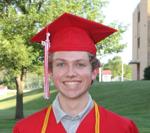NORTH MANKATO – Sitting in the doctor’s office at the age of 9, Noah Gersich vividly remembers his thoughts.
“My story is ironic,” he said. “I was just thinking of needles.”
He came to the doctor after his third grade teacher saw possible warning signs of diabetes in class. Gersich just hoped to avoid any kind of needle in this exam room.
“So it only fit when the doctor came in and said I would take five syringes a day and stab my finger ten times a day,” he said.
Gersich learned that day about nine years ago that he had type 1 diabetes. He’s certainly got more used to needles in recent years – advances in technology mean he doesn’t have to use them nearly as often – and how to live with a chronic illness.
Now 18 and a recent graduate of Mankato West High School, the young man from North Mankato’s hard work in academic and extracurricular areas earned him a $ 5,000 Diabetes Scholars program.
He is one of 62 students in the country receiving scholarships this year through the program, which is part of the nonprofit Beyond Type 1. He earned it – along with a National Merit Scholarship – by achieving a GPA of 4.0, winning West’s math team with the state title and leading the violin section of the Mankato Area Youth Symphony Orchestra.
Beyond Type 1 CEO Thom Scher praised this year’s Diabetes Fellows in a press release announcing the recipients for 2021.
“These people persevered in spite of an often invisible chronic illness that increased the already high demands on school work, extracurricular activities, jobs and much more,” said Scher.
Gersich thanked the nonprofit Beyond Type 1 and indicated that he can see how their resources help young people like him. Getting the scholarship was exciting, he added, and it gave him the opportunity to share his story about growing up with Type 1.
Although he has eventually overcome his fear of needles, he does not see the disease itself as something to be overcome.
“Conquering diabetes” or “overcoming” can be a strong message, but he feels like it’s a bit idealistic. He quotes Sir Frederick Banting, the man who co-discovered insulin in 1921, as saying, “Insulin is not a cure for diabetes; it’s a treatment. “
So he does not set out to overcome a disease like diabetes, but to treat it. There’s no cure yet, but Gersich said that with insulin he was able to “do what other people can do”.
It just requires more planning and preparation in its case. If your pancreas doesn’t naturally regulate your blood sugar, activities like eating and physical activity need better planning.
However, type 1 diabetes is an autoimmune disease. All the planning in the world will not eliminate all unpredictability.
“Even if I plan everything for a major test two weeks in advance, you never know what will happen,” said Gersich. “That is one of the most difficult aspects of the disease.”
The planning and extra work involved in daily living is one of the hidden aspects of type 1 diabetes, his mother Becky said. Since her son is the only person in the family who has the disease, he became familiar with the disease through him.
“My very first reaction was extreme appreciation,” she said of her son’s scholarship. “Appreciation that there is an opportunity for type 1 diabetics to receive something like this and to be recognized for the additional work they have to do in everyday life.”

Noah Gersich
Gersich plans to continue his education at the University of Illinois Urbana-Champaign this fall, where he will study computer science. The math skills he has honed in courses and competitions should serve him well.
After a senior year turned on its head by the COVID-19 pandemic, he is also looking forward to working with other students again through group work.
“I look forward to meeting new people with the same passions as me and working together,” he said. “It is definitely exciting and I am very happy with where I am and where I will be, but of course I have to keep working hard.”
